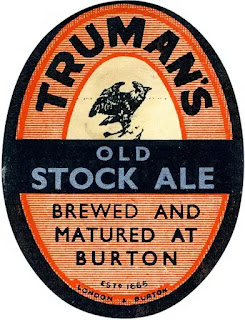Starting with the grist. Which, in this case, is particularly simple, consisting of just a single type of base pale malt. While the Runner version contained a bit over 10% sugar in addition to the base malt.
The hopping rate is, as you would expect, much higher than in the Runner. 9.5 lbs per quarter (336 lbs) of malt compared to 5 lbs. Which results in a much higher calculated bitterness level. The hops are there to protect this beer during the ageing process.
The two types of hops are the same. Except that, rather than being in similar quantities, they were in the ratio of two Hallertau to one English.
The maturation process would have probably lasted between 12 and 18 months.
| 1883 Truman (Burton) No. 4 Ale Stock | ||
| pale malt | 18.00 lb | 100.00% |
| Fuggles 180 mins | 2.50 oz | |
| Hallertau 60 mins | 2.50 oz | |
| Hallertau 30 mins | 2.50 oz | |
| OG | 1077 | |
| FG | 1017.5 | |
| ABV | 7.87 | |
| Apparent attenuation | 77.27% | |
| IBU | 79 | |
| SRM | 6 | |
| Mash at | 149º F | |
| Sparge at | 170º F | |
| Boil time | 180 minutes | |
| pitching temp | 55º F | |
| Yeast | WLP013 London Ale (Worthington White Shield) | |

Do the records ever indicate how they were blended? Was it just a simple 50-50 mix, or did it get more complicated in terms of the numbers and ratios of beers?
ReplyDeleteUsually it was about one part old to two parts young. But the exact ratio was often determined by taste. The more acidic the old beer the more young beer used in the blend.
ReplyDeleteHave you ever thought about doing a series on contemporary mild ale.
ReplyDeleteOscar